How VPNs Help You Bypass Censorship
VPN


The internet is often described as a place of free information, but in reality, access is far from equal. In many countries, governments, ISPs, and even schools or workplaces restrict what people can see and do online. This practice is known as internet censorship. For users living under strict digital controls—or even travelers visiting such regions—censorship can feel like a wall between them and the free internet. Fortunately, a VPN (Virtual Private Network) can be the key to climbing over that wall.
What Is Internet Censorship?
Censorship can take many forms:
Government Restrictions: Blocking social media, news websites, or communication apps.
Workplace or School Filters: Preventing access to entertainment, gaming, or streaming sites.
Cultural or Political Controls: Limiting access to content deemed “inappropriate” or “sensitive.”
The result? Users are often cut off from global conversations, independent news, and even basic communication tools.
How VPNs Overcome Censorship
A VPN works by creating an encrypted tunnel between your device and a secure server in another location. Here’s how this helps bypass censorship:
Hiding Your IP Address
Censors often block websites by detecting your IP location. A VPN replaces your IP with the address of its server, making it look like you’re browsing from another country.
Encrypting Your Traffic
Encrypted data can’t easily be read by ISPs or monitoring systems. This prevents censors from seeing which sites you visit.
Accessing Blocked Services
With the right server, you can access social media, news platforms, or streaming sites that are otherwise blocked in your region.
Circumventing Firewalls
Some countries use firewalls to block access to international content. VPNs disguise your traffic, making it harder for firewalls to filter it out.
Real-World Examples of Censorship
China: Known for the “Great Firewall,” which blocks Google, Facebook, Twitter, and many Western news outlets.
Middle East: Some countries restrict VoIP services like WhatsApp and Skype.
Workplaces & Universities: Often block YouTube, gaming platforms, or streaming services to maintain productivity.
For people in these situations, VPNs are a lifeline to unrestricted information and communication.
Limitations of VPNs in Censored Regions
While VPNs are powerful, they’re not invincible. Some governments use advanced technologies to detect and block VPN traffic. This is why choosing the right VPN is crucial. Look for:
Obfuscated Servers – Hide VPN traffic so it looks like regular internet activity.
Stealth Protocols – Advanced protocols (like WireGuard with obfuscation) bypass deep packet inspection (DPI).
Server Variety – A wide global network helps you find working connections.
It’s also important to remember that in some countries, VPN use is restricted or illegal. Always research local laws before relying on a VPN in such regions.
Benefits of Using a VPN Beyond Bypassing Censorship
Even if censorship isn’t your main concern, VPNs add value by:
Protecting Your Privacy – Prevents ISPs and third parties from monitoring your activity.
Securing Public Wi-Fi – Shields your data from hackers in airports, hotels, or cafés.
Unlocking Content – Access geo-restricted streaming libraries and services worldwide.
Safety Tips for Using a VPN in Restricted Areas
Use a Trusted Provider – Free or unknown VPNs may log your data or fail against censorship firewalls.
Enable Kill Switch – Ensures your data isn’t exposed if the VPN connection drops.
Keep Software Updated – VPN apps regularly update to stay ahead of censorship tactics.
Avoid Sharing Personal Data – Even with a VPN, posting identifiable information can compromise your anonymity.
Final Thoughts
Internet censorship threatens the principles of free expression and access to information. VPNs provide an effective solution by hiding your IP, encrypting your traffic, and giving you access to the unrestricted web.
While they’re not a cure-all—and may face limits in countries with advanced censorship—a reliable VPN is often the difference between a restricted internet and one that’s open and free.
For students, journalists, travelers, or anyone living under digital restrictions, a VPN is not just a privacy tool—it’s a gateway to freedom.